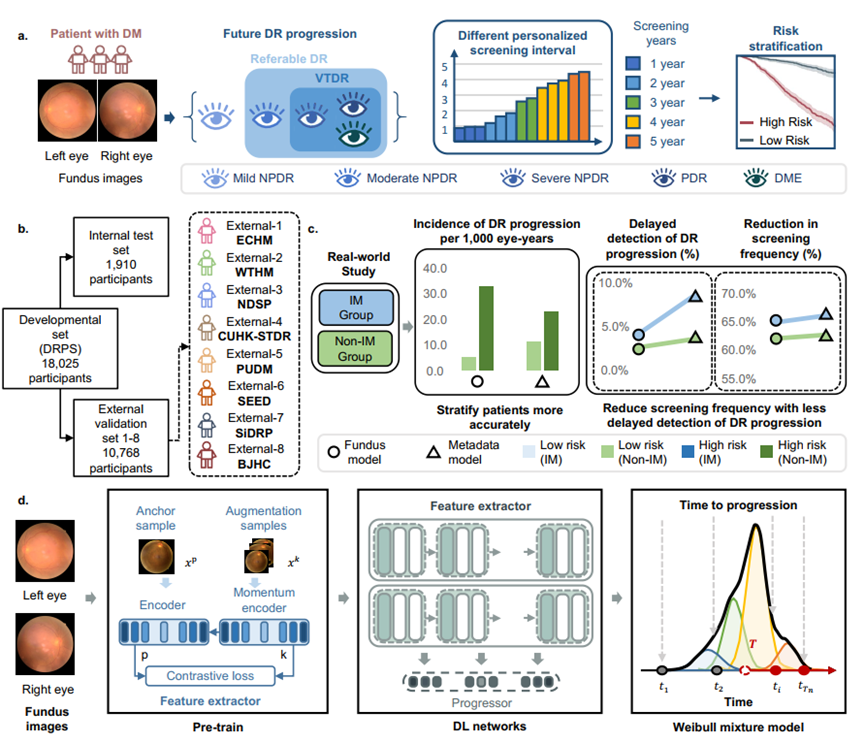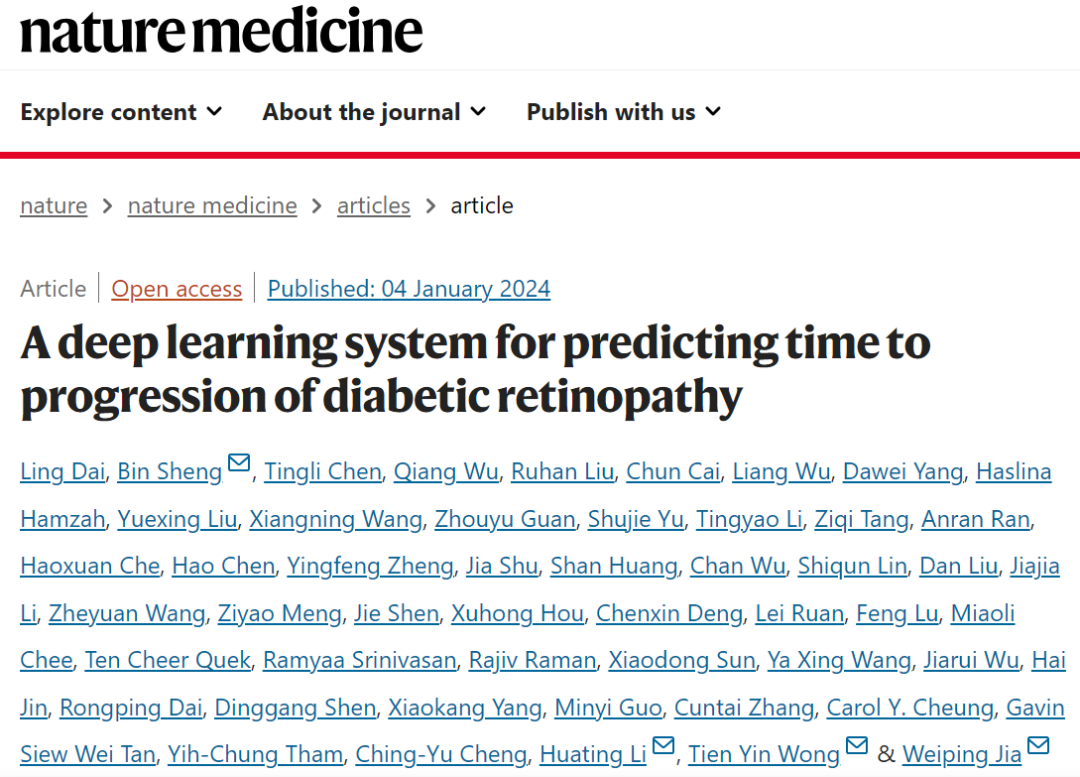Professor Jia Weiping's Team Develops Deep Learning System for Precise Prediction of Diabetic Retinopathy Progression 2024-01-09

On January 4, 2024, Professor Jia Weiping, Director of the Institute for Active Health Strategy and Development at Shanghai Jiao Tong University (SJTU), along with teams from the Endocrinology and Metabolism Department of the Sixth People's Hospital of Shanghai and the Tsinghua University Medical Engineering Interdisciplinary Team, published their latest research in the prestigious journal "Nature Medicine." This significant breakthrough, a deep learning system named "DeepDR Plus," can precisely predict the progression of diabetic retinopathy.
Following their successful development of the "DeepDR" diagnostic assistance system in 2021, the interdisciplinary team further constructed the "DeepDR Plus" system. Utilizing fundus images, this advanced system can accurately forecast the progression of diabetic retinopathy, contributing to global efforts in intelligent prevention and control of diabetes complications. This development is expected to guide new strategies for screening and prevention of diabetic retinopathy worldwide.
DeepDR Plus System Overview and Research Design:
Diabetic retinopathy (DR) is the most common microvascular complication of diabetes and a leading cause of preventable blindness globally. The disease's early stages are often asymptomatic, but it can lead to permanent vision impairment or blindness if it progresses. The risk and timing of DR development vary significantly among patients, making accurate prediction challenging.
Artificial intelligence, particularly deep learning, has been employed in DR screening. However, predicting the risk of DR based on fundus images remains a global challenge. Diabetic patients typically undergo screening or follow-up at fixed intervals, leaving the exact onset or progression of complications unknown. This limitation prevents traditional deep learning models from accurately modeling the disease's progression timeline and predicting individual onset and progression.
Addressing this global technical bottleneck and clinical need, the research for the first time utilizes a large-scale medical imaging longitudinal cohort encompassing over 200,000 diabetic patients from multiple countries and ethnicities. The team innovatively proposed a deep learning framework based on the Weibull mixture distribution model, treating the onset and progression of diabetic retinopathy as random variables within the screening interval. Through survival analysis and temporal distribution probability modeling, they successfully predicted the risk and timing of diabetic retinopathy progression.
Applied in real clinical workflows in China and India, the system demonstrated that it could maintain an extremely low misdiagnosis rate while significantly reducing screening frequency and public health costs. This provides a basis for personalized screening and management decisions in future diabetic complication control practices.
Early screening and intervention are crucial for the prevention and management of DR. Most national and international organizations recommend annual routine fundus photography for diabetic patients with no or mild DR to detect retinal changes timely. However, the implementation and popularization of routine fundus photography are challenging, especially in middle- and low-income countries, due to economic and medical resource constraints. This study is the first to achieve individualized prediction of diabetic retinopathy risk and timing. The DeepDR Plus system accurately predicts individualized risks and timing of DR progression over five years based on baseline fundus images, outperforming traditional clinical parameter models.
Additionally, the DeepDR Plus system can accurately identify high and low-risk groups, offering AI-driven personalized follow-up interval recommendations (suggesting longer intervals for low-risk patients without missing sight-threatening DR) and management strategies (suggesting stricter comprehensive interventions for high-risk patients).
Integrating AI-driven personalized screening intervals into diabetic retinopathy screening systems, especially in developing countries, can greatly enhance the efficiency, equity, and accessibility of fundus photography screening. This research provides new evidence for diabetic retinopathy screening, prevention, and treatment guidelines, potentially impacting future clinical practices and medical expenses for diabetic retinopathy. It contributes Chinese technology and Asian strength to the global map of intelligent diabetes control, paving new paths for enhancing and innovating diabetes management models in "Belt and Road" countries and other middle- and low-income regions.
Professor Jia Weiping of Shanghai Jiao Tong University, Professor Huang Tianyin of Tsinghua University, Professor Li Huating of the Sixth People's Hospital of Shanghai, and Professor Sheng Bin of Shanghai Jiao Tong University are the co-corresponding authors of the paper. Doctoral student Dai Ling (co-supervised by Professor Jia Weiping and Professor Sheng Bin), Director Chen Tingli of the East China Convalescent Hospital, Director Wu Qiang of the Sixth People's Hospital of Shanghai, and Dr. Liu Ruhuan of Shanghai Jiao Tong University are the co-first authors.
The work was guided and supported by Professor Carol Y. Cheung of the Chinese University of Hong Kong, Professor Gavin Tan Siew Wei, Yih-Chung Tham, and Ching-Yu Cheng of the Singapore National Eye Centre, among others. Multidisciplinary experts from Peking Union Medical College, Capital Medical University, Huazhong University of Science and Technology, Shanghai University of Science and Technology, Sun Yat-sen University, Hong Kong University of Science and Technology, and Shri Bhagwan Mahavir Vitreo Retinal Centre in India also assisted. The study received funding from the National Key R&D Program of the Ministry of Science and Technology, the National Natural Science Foundation, the "Belt and Road" International Joint Laboratory project of the Shanghai Science and Technology Commission, the Shanghai Center for Endocrine and Metabolic Diseases (Key Project), and the "SJTU Star" Plan Medical Engineering Cross Research Fund of Shanghai Jiao Tong University.

About Professor Jia Weiping:
Prof. Jia Weiping, a Distinguished Chair Professor at Shanghai Jiao Tong University, holds doctoral supervisory positions in both the School of Medicine and the Antai College of Economics and Management (ACEM). She currently heads the Institute for Health Strategy and Development at Shanghai Jiao Tong University and serves as the Director of the Shanghai Diabetes Research Institute, as well as the National Office for Primary Diabetes Prevention and Control Management. Prof. Jia also acts as a consultant for the Shanghai Municipal Government. In addition, she has held positions as the former chairperson of the Diabetes Society of the Chinese Medical Association, the Editor-in-Chief of the "Chinese Journal of Internal Medicine," and the Associate Editor of the "Journal of Molecular Cell Biology." Previously, she was the President of the Shanghai Sixth People's Hospital and was elected as an academician of the Chinese Academy of Engineering in 2021.
Dedicated to the research and management of precise diagnosis, early warning screening, pathogenesis, and prevention of diabetes, Prof. Jia has been awarded two National Second Prizes for Progress in Science and Technology, ranking first and second respectively, and five provincial-level First Prizes for Science and Technology Progress, each time ranking first. She has led significant national projects, including the National Basic Research Program of China (973 Program) and the National Key R&D Program. As a corresponding or co-corresponding author, she has published over 299 papers in prestigious international journals such as BMJ, Diabetes Care, and Lancet Diabetes Endocrinol. Prof. Jia has also edited the first bilingual monograph on Continuous Glucose Monitoring and is a recipient of the Ho Leung Ho Lee Prize for Scientific and Technological Progress and the Distinguished Research Award for Epidemiology of Diabetes in Asia from the Asian Association for the Study of Diabetes.





